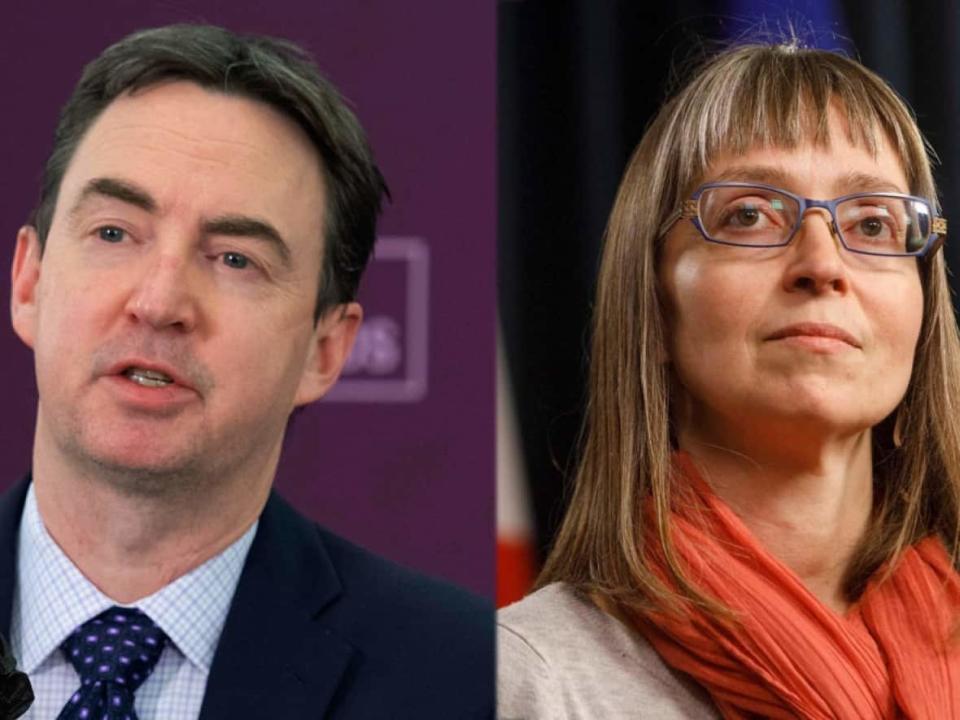Alberta ends regularly scheduled COVID-19 updates

There will be no more regularly scheduled COVID-19 news conferences, Alberta's chief medical officer of health said Wednesday.
The severity of the Omicron wave has been slowly declining for weeks. The provincial government changed its COVID-19 updates with Dr. Deena Hinshaw and Health Minister Jason Copping from a weekly occurrence to bi-weekly.
During Wednesday's news conference, Hinshaw announced it would be the last regularly scheduled COVID update.
"We remain committed to the transparent communication of important public health information, and we will, of course, provide updates as necessary," she said.
Alberta Health will continue updating public COVID-19 data each week, she said.
Upcoming changes to how public health officials monitor COVID-19, which are supposed to make things more sustainable, will affect the public data dashboard later this summer, Hinshaw said.
In the fall, Alberta Health will change its COVID reporting so it aligns with that of its influenza dashboard, showing how the two respiratory illnesses are spreading, she added.
The stoppage of regular in-person updates is part of this transition, Hinshaw said.
"We're entering a phase of the pandemic where our response can be de-escalated, while we remain vigilant and prepared to respond to new variants that may drive another wave of cases and hospital admissions," Copping said Wednesday.
Last week, Alberta dropped mandatory public health restrictions, except for some measures in Alberta Health Services facilities and other health facilities.
Public health orders for continuing-care facilities will be rescinded June 30, Copping said, but protective policies will stay in place as part of operating standards.
Alberta Health Services will monitor outbreaks in higher-risk settings and respond as needed, he said.

Later this summer, some AHS testing sites will be turned into swabbing sites that will be integrated with other services, Copping said.
Hinshaw noted that living with COVID-19 does not mean it is going away, but that the province has tools available to lift public health restrictions.
COVID-19 vaccines are one of those tools, she added. Hinshaw encouraged Albertans to get their initial vaccine doses (if they haven't already), and booster doses when eligible to do so.
Provincial data suggests the government can step-back public health measures, said Noel Gibney, a University of Alberta professor emeritus of critical care medicine. But he hopes restrictions will come back if there's another surge driven by new variants.
"The public health and medical science tells us that this pandemic is not going to behave how we hoped it would," Gibney said.
Being prepared to reimpose restrictions would show the Alberta government wants to keep the public safe, and it recognizes the strain hospitals have been under during massive surges, Gibney said.
He said that, given the low level of testing, Alberta could be in the middle of a surge by the time data shows one has occurred.
13 more Albertans die from COVID-19
Alberta public health officials identified 13 more COVID-19 deaths from June 14 to 20, the latest reporting week.
A total of 4,604 Albertans have now died from the illness since the pandemic began.
Meanwhile, there were fewer Albertans in hospital with COVID-19 than the previous reporting week.
As of Monday, 661 people were being treated in hospital, including 17 patients receiving critical care.
There were 719 hospitalizations, including 19 intensive care unit patients, a week ago.
The seven-day PCR test-positivity rate dropped to 12.32 per cent in the latest reporting week. Last week, the seven-day test-positivity rate was about 13.2 per cent.
There were 1,086 new COVID-19 cases identified through PCR testing in the latest reporting week — nearly 400 fewer than the previous week.
The amount of virus circulating in the community is believed to be higher because most Albertans cannot access PCR tests and the data excludes positive rapid test results.
Of Alberta's entire population, including those who are ineligible, 77.3 per cent of people have two doses of COVID-19 vaccine; 81.5 per cent of the population has at least one dose.
Dr. Lynora Saxinger, a University of Alberta infectious diseases specialist, said she is concerned that the upcoming reporting changes may further the misconception that the pandemic is over, especially given the high levels of transmission.
"There is a balance to be struck there," Saxinger said.
"Some people are like, 'Absolutely, do all the same things that what we used to,' and I'm not sure that's quite right. On the other hand, we have people like, 'It's over, we don't even have to think about it anymore,' and that's not right either."
Another monkeypox case identified
One new case of monkeypox has been reported in Alberta, Hinshaw said.
The person is an adult, and they are connected to another monkeypox case reported outside the province, she said, adding the risk of infection in Alberta is low.
There have now been five total cases found in Alberta. all from reported in the Calgary and Edmonton health zones, she said.

